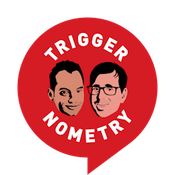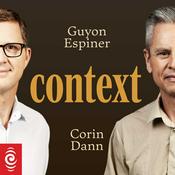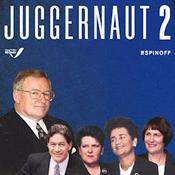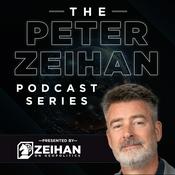101 episodes

Will Turso Be The Better SQLite? (with Glauber Costa)
11/12/2025 | 1h 51 mins.
SQLite is embedded everywhere - phones, browsers, IoT devices. It's reliable, battle-tested, and feature-rich. But what if you want concurrent writes? Or CDC for streaming changes? Or vector indexes for AI workloads? The SQLite codebase isn't accepting new contributors, and the test suite that makes it so reliable is proprietary. So how do you evolve an embedded database that's effectively frozen?Glauber Costa spent a decade contributing to the Linux kernel at Red Hat, then helped build Scylla, a high-performance rewrite of Cassandra. Now he's applying those lessons to SQLite. After initially forking SQLite (which produced a working business but failed to attract contributors), his team is taking the bolder path: a complete rewrite in Rust called Turso. The project already has features SQLite lacks - vector search, CDC, browser-native async operation - and is using deterministic simulation testing (inspired by TigerBeetle) to match SQLite's legendary reliability without access to its test suite.The conversation covers why rewrites attract contributors where forks don't, how the Linux kernel maintains quality with thousands of contributors, why Pekka's "pet project" jumped from 32 to 64 contributors in a month, and what it takes to build concurrent writes into an embedded database from scratch.--Support Developer Voices on Patreon: https://patreon.com/DeveloperVoicesSupport Developer Voices on YouTube: https://www.youtube.com/@DeveloperVoices/joinTurso: https://turso.tech/Turso GitHub: https://github.com/tursodatabase/tursolibSQL (SQLite fork): https://github.com/tursodatabase/libsqlSQLite: https://www.sqlite.org/Rust: https://rust-lang.org/ScyllaDB (Cassandra rewrite): https://www.scylladb.com/Apache Cassandra: https://cassandra.apache.org/DuckDB (analytical embedded database): https://duckdb.org/MotherDuck (DuckDB cloud): https://motherduck.com/dqlite (Canonical distributed SQLite): https://canonical.com/dqliteTigerBeetle (deterministic simulation testing): https://tigerbeetle.com/Redpanda (Kafka alternative): https://www.redpanda.com/Linux Kernel: https://kernel.org/Datadog: https://www.datadoghq.com/Glauber Costa on X: https://x.com/glcstGlauber Costa on GitHub: https://github.com/glommerKris on Bluesky: https://bsky.app/profile/krisajenkins.bsky.socialKris on Mastodon: http://mastodon.social/@krisajenkinsKris on LinkedIn: https://www.linkedin.com/in/krisjenkins/--0:00 Intro3:16 Ten Years Contributing to the Linux Kernel15:17 From Linux to Startups: OSv and Scylla26:23 Lessons from Scylla: The Power of Ecosystem Compatibility33:00 Why SQLite Needs More37:41 Open Source But Not Open Contribution48:04 Why a Rewrite Attracted Contributors When a Fork Didn't57:22 How Deterministic Simulation Testing Works1:06:17 70% of SQLite in Six Months1:12:12 Features Beyond SQLite: Vector Search, CDC, and Browser Support1:19:15 The Challenge of Adding Concurrent Writes1:25:05 Building a Self-Sustaining Open Source Community1:30:09 Where Does Turso Fit Against DuckDB?1:41:00 Could Turso Compete with Postgres?1:46:21 How Do You Avoid a Toxic Community Culture?1:50:32 Outro

Can Google's ADK Replace LangChain and MCP? (with Christina Lin)
20/11/2025 | 1h 5 mins.
How do you build systems with AI? Not code-generating assistants, but production systems that use LLMs as part of their processing pipeline. When should you chain multiple agent calls together versus just making one LLM request? And how do you debug, test, and deploy these things? The industry is clearly in exploration mode—we're seeing good ideas implemented badly and expensive mistakes made at scale. But Google needs to get this right more than most companies, because AI is both their biggest opportunity and an existential threat to their search-based business model.Christina Lin from Google joins us to discuss Agent Development Kit (ADK), Google's open-source Python framework for building agentic pipelines. We dig into the fundamental question of when agent pipelines make sense versus traditional code, exploring concepts like separation of concerns for agents, tool calling versus MCP servers, Google's grounding feature for citation-backed responses, and agent memory management. Christina explains A2A (Agent-to-Agent), Google's protocol for distributed agent communication that could replace both LangChain and MCP. We also cover practical concerns like debugging agent workflows, evaluation strategies, and how to think about deploying agents to production.If you're trying to figure out when AI belongs in your processing pipeline, how to structure agent systems, or whether frameworks like ADK solve real problems versus creating new complexity, this episode breaks down Google's approach to making agentic systems practical for production use.--Support Developer Voices on Patreon: https://patreon.com/DeveloperVoicesSupport Developer Voices on YouTube: https://www.youtube.com/@DeveloperVoices/joinGoogle Agent Development Kit Announcement: https://developers.googleblog.com/en/agent-development-kit-easy-to-build-multi-agent-applications/ADK on GitHub: https://google.github.io/adk-docs/Google Gemini: https://ai.google.dev/gemini-apiGoogle Vertex AI: https://cloud.google.com/vertex-aiGoogle AI Studio: https://aistudio.google.com/Google Grounding with Google Search: https://cloud.google.com/vertex-ai/generative-ai/docs/grounding/overviewModel Context Protocol (MCP): https://modelcontextprotocol.io/Anthropic MCP Servers: https://github.com/modelcontextprotocol/serversLangChain: https://www.langchain.com/Kris on Bluesky: https://bsky.app/profile/krisajenkins.bsky.socialKris on Mastodon: http://mastodon.social/@krisajenkinsKris on LinkedIn: https://www.linkedin.com/in/krisjenkins/

Building Observable Systems with eBPF and Linux (with Mohammed Aboullaite)
31/10/2025 | 1h 11 mins.
How do you monitor distributed systems that span dozens of microservices, multiple languages, and different databases? The old approach of gathering logs from different machines and recompiling apps with profiling flags doesn't scale when you're running thousands of servers. You need a unified strategy that works everywhere, on every component, in every language—and that means tackling the problem from the kernel level up.Mohammed Aboullaite is a backend engineer at Spotify, and he joins us to explore the latest in continuous profiling and observability using eBPF. We dive into how eBPF lets you programmatically peek into the Linux kernel without recompiling it, why companies like Google and Meta run profiling across their entire infrastructure, and how to manage the massive data volumes that continuous profiling generates. Mohammed walks through specific tools like Pyroscope, Pixie, and Parca, explains the security model of loading code into the kernel, and shares practical advice on overhead thresholds, storage strategies, and getting organizational buy-in for continuous profiling.Whether you're debugging performance issues, optimizing for scale, or just want to see what your code is really doing in production, this episode covers everything from packet filters to cultural changes in service of getting a clear view of your software when it hits production.---Support Developer Voices on Patreon: https://patreon.com/DeveloperVoicesSupport Developer Voices on YouTube: https://www.youtube.com/@DeveloperVoices/joineBPF: https://ebpf.io/Google-Wide Profiling Paper (2010): https://research.google.com/pubs/archive/36575.pdfGoogle pprof: https://github.com/google/pprofContinuous Profiling Tools:Pyroscope (Grafana): https://grafana.com/oss/pyroscope/Pixie (CNCF): https://px.dev/Parca: https://www.parca.dev/Datadog Continuous Profiler: https://www.datadoghq.com/product/code-profiling/Supporting Technologies:OpenTelemetry: https://opentelemetry.io/Grafana: https://grafana.com/New Relic: https://newrelic.com/Envoy Proxy: https://www.envoyproxy.io/Spring Cloud Sleuth: https://spring.io/projects/spring-cloud-sleuthMohammed Aboullaite:LinkedIn: https://www.linkedin.com/in/aboullaite/GitHub: https://github.com/aboullaiteWebsite: http://aboullaite.meTwitter/X: https://twitter.com/laytounKris on Bluesky: https://bsky.app/profile/krisajenkins.bsky.socialKris on Mastodon: http://mastodon.social/@krisajenkinsKris on LinkedIn: https://www.linkedin.com/in/krisjenkins/

Solving Git's Pain Points with Jujutsu (with Martin von Zweigbergk)
09/10/2025 | 1h 11 mins.
Git might be the most ubiquitous tool in software development, but that doesn't mean it's perfect. What if we could keep Git compatibility while fixing its most frustrating aspects—painful merges, scary rebases, being stuck in conflict states, and the confusing staging area?This week we're joined by Martin von Zweigbergk, creator of Jujutsu (JJ), a Git-compatible version control system that takes a fundamentally different approach. Starting from a simple idea—automatically snapshotting your working copy—Martin has built a tool that reimagines how we interact with version control. We explore the clever algebra behind Jujutsu's conflict handling that lets you store conflicts as commits and move freely through your repository even when things are broken. We discuss why there's no staging area, how the operation log gives you powerful undo/redo capabilities, and why rebasing becomes trivially easy when you can edit any commit in your history and have changes automatically propagate forward.Whether you're a Git power user frustrated by interactive rebases, someone who's lost work to a botched merge, or just curious about how version control could work differently, this conversation offers fresh perspectives on a tool we all take for granted. And if you're working with large monorepos or game development assets, Martin's vision for the future of Jujutsu might be exactly what you've been waiting for.---Support Developer Voices on Patreon: https://patreon.com/DeveloperVoicesSupport Developer Voices on YouTube: https://www.youtube.com/@DeveloperVoices/joinJujutsu (JJ): https://github.com/martinvonz/jjJujutsu Documentation: https://martinvonz.github.io/jj/Git: https://git-scm.com/Mercurial: https://www.mercurial-scm.org/Rust: https://www.rust-lang.org/Watchman: https://facebook.github.io/watchman/Google Piper: https://research.google/pubs/why-google-stores-billions-of-lines-of-code-in-a-single-repository/Kris on Bluesky: https://bsky.app/profile/krisajenkins.bsky.socialKris on Mastodon: http://mastodon.social/@krisajenkinsKris on LinkedIn: https://www.linkedin.com/in/krisjenkins/

Getting New Technology Adopted (with Dov Katz)
24/9/2025 | 1h 5 mins.
Getting new technology adopted in a large organization can feel like pushing water uphill. The best tools in the world are useless if we're not allowed to use them, and as companies grow, their habits turn into inertia, then into "the way we've always done things." So how do you break through that resistance and get meaningful change to happen?This week's guest is Dov Katz from Morgan Stanley, who specializes in exactly this challenge - driving developer productivity and getting new practices adopted across thousands of developers. We explore the art of organizational change from every angle: How do you get management buy-in? How do you build grassroots developer enthusiasm? When should you use deterministic tools like OpenRewrite versus AI-powered solutions? And what role does open source play in breaking down the walls between competing financial institutions?Whether you're trying to modernize a legacy codebase, reduce technical debt, or just get your team to try that promising new tool you've discovered, this conversation offers practical strategies for navigating the complex dynamics of enterprise software development. Because sometimes the hardest part of our job isn't writing code - it's getting permission to write better code.---Support Developer Voices on Patreon: https://patreon.com/DeveloperVoicesSupport Developer Voices on YouTube: https://www.youtube.com/@DeveloperVoices/joinMorgan Stanley: https://www.morganstanley.com/OpenRewrite: https://docs.openrewrite.org/Spring Framework: https://spring.io/Spring Integration: https://spring.io/projects/spring-integrationApache Camel: https://camel.apache.org/FINOS (FinTech Open Source Foundation): https://www.finos.org/Linux Foundation: https://www.linuxfoundation.org/Moderne (Code Remix conference organizers): https://www.moderne.io/Code Remix Conference: https://www.moderne.io/eventsKris on Bluesky: https://bsky.app/profile/krisajenkins.bsky.socialKris on Mastodon: http://mastodon.social/@krisajenkinsKris on LinkedIn: https://www.linkedin.com/in/krisjenkins/
More News podcasts
Trending News podcasts
About Developer Voices
Listen to Developer Voices, Pod Save America and many other podcasts from around the world with the radio.net app
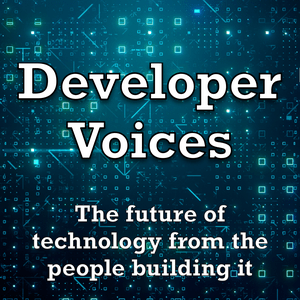
Get the free radio.net app
- Stations and podcasts to bookmark
- Stream via Wi-Fi or Bluetooth
- Supports Carplay & Android Auto
- Many other app features
Get the free radio.net app
- Stations and podcasts to bookmark
- Stream via Wi-Fi or Bluetooth
- Supports Carplay & Android Auto
- Many other app features


Developer Voices
download the app,
start listening.




